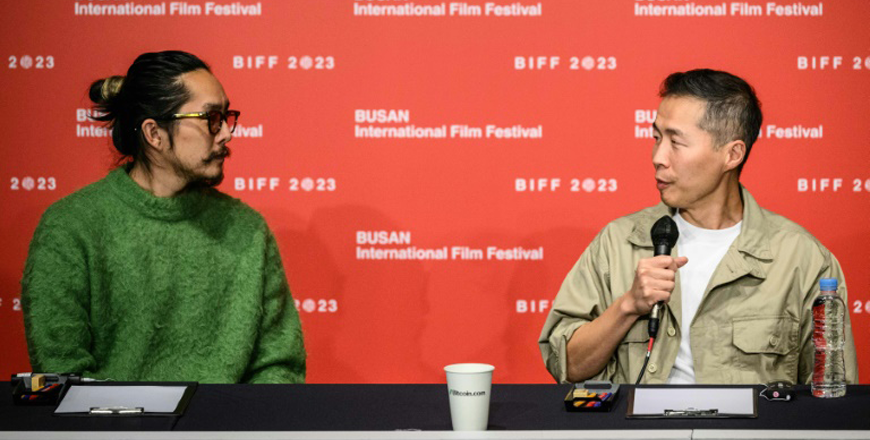You are here
S. Korean migrant's tale to open Asia's biggest film festival
By AFP - Oct 04,2023 - Last updated at Oct 04,2023

A man walks past signage for the 28th Busan International Film Festival in Busan on Wednesday (AFP photo)
BUSAN, South Korea — The world premiere of Jang Kun-jae's "Because I Hate Korea" will open Asia's largest film festival on Wednesday night as it looks to rally from a year marked by scandal and budget cutbacks.
The South Korean director's tale of a disillusioned young woman who relocates to New Zealand is among 209 official entries from 69 countries set to unspool at the Busan International Film Festival (BIFF), which runs until October 13.
Eighty will be making their world premieres in the southern port city.
This year's edition comes as organisers grapple with the fallout from former festival director Huh Moon-yung's resignation in May amid accusations of sexual misconduct.
The scandal saw BIFF's 2023 budget reduced by about 10 per cent as sponsors withdrew in the wake of the allegations, according to organisers.
Kang Seung-ah, now serving as acting deputy director, acknowledged they had endured a "difficult phase" before assembling a lineup she said was "more substantial than ever before".
Opening night director Jang, who noted he'd attended BIFF far more as an audience member than a filmmaker, told a late afternoon news conference he had sought to address serious questions with his film.
"I believe it's necessary to pay attention to the fact that many young people are finding it difficult to navigate through Korean society. I started questioning whether our society is providing a fair and equitable foundation for young people to pursue their dreams," he told reporters after a preview screening.
Based on the best-selling Chang Kang-myoung novel, "Because I Hate Korea" received support from BIFF's Asia Project Market back in 2016. South Korea has transformed itself into a cultural powerhouse since then thanks to the explosive success of the Oscar-winning "Parasite" and the Netflix series "Squid Game".
"Many people are now showing great interest in Korean content such as K-pop, K-movies, and K-dramas. Living in such an era, they might develop a certain fantasy about South Korea, I think," Nam Dong-chul, the festival's acting interim director, told reporters.
But "I thought it might be good to consider these views from the perspective of people living in Korea and especially the youth in South Korea,” he said of the opening night choice. "They might have different thoughts and experiences."
Frequent Bong Joon-ho collaborator Go Ah-sung, who delivered a memorable performance as the protagonist of "Because I Hate Korea", was unable to attend the festival due to a back injury.
'Dear Jinri'
Despite Go's absence, the festival will still feature serious star power, with acclaimed Hong Kong actor Chow Yun Fat schedulled to receive the Asian Filmmaker of the Year award.
Three of Chow's films — "A Better Tomorrow" (1986), "Crouching Tiger, Hidden Dragon" (2000) and 2023's "One More Chance" — will be screened in his honour.
Other highly anticipated screenings include "Dear Jinri", a documentary that features late K-pop star Sulli's last and incomplete project.
Sulli, born Choi Jin-ri, took her own life in 2019 after a long struggle with online bullying. The film includes her final media interview, which has not been disclosed previously.
Korea's filmmaking diaspora will also be showcased with a special series of screenings that includes "Searching" (2018), starring John Cho, and director Celine Song's Sundance favourite "Past Lives".
Netflix's highly anticipated "Yellow Door: 90s Lo-fi Film Club" will also have its world premiere at BIFF.
The documentary spotlights South Korea's renowned cinephile generation of the 1990s, acclaimed "Parasite" director Bong among them.
"The Movie Emperor", director Ning Hao's satirical take on the Chinese film industry starring Hong Kong actor Andy Lau, is set to close the festival.
Ning's comedy "deftly captures the fine line between the film industries in Hong Kong and mainland China", as well as the "delicate relationship between Western film festivals and Asian filmmakers", according to the programme notes.
Related Articles
BUSAN, South Korea — The rise of South Korean diasporic cinema — characterised by films like Lee Isaac Chung’s “Minari” and Justin Chon’s “J
BUSAN, South Korea — Virtual Reality (VR) will change the face of cinema in the next decade — but only if content keeps up with the advances
TOKYO — North Korean defectors in Tokyo symbolically summoned Kim Jong -un to court on Thursday over a repatriation programme they described

















